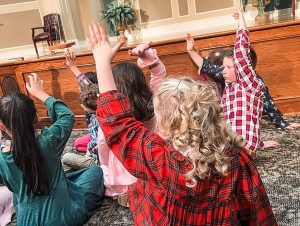And Nathan said to David, Thou art the man. Thus saith the LORD God of Israel, I anointed thee king over Israel, and I delivered thee out of the hand of Saul; And I gave thee thy master’s house, and thy master’s wives into thy bosom, and gave thee the house of Israel and of Judah; and if that had been too little, I would moreover have given unto thee such and such things. Wherefore hast thou despised the commandment of the LORD, to do evil in his sight? thou hast killed Uriah the Hittite with the sword, and hast taken his wife to be thy wife, and hast slain him with the sword of the children of Ammon. Now therefore the sword shall never depart from thine house; because thou hast despised me, and hast taken the wife of Uriah the Hittite to be thy wife. Thus saith the LORD, Behold, I will raise up evil against thee out of thine own house, and I will take thy wives before thine eyes, and give them unto thy neighbour, and he shall lie with thy wives in the sight of this sun. For thou didst it secretly: but I will do this thing before all Israel, and before the sun. And David said unto Nathan, I have sinned against the LORD. And Nathan said unto David, The LORD also hath put away thy sin; thou shalt not die. Howbeit, because by this deed thou hast given great occasion to the enemies of the LORD to blaspheme, the child also that is born unto thee shall surely die (2 Sam. 12:7-14).
David probably did not know that Bathsheba belonged to someone else when he called for her to be his wife, but he understood that he had sinned concerning Bathsheba and Uriah once he knew Uriah was her husband. As it became harder and harder to cover his sin, he obviously thought about having Uriah killed in battle, but he was only fooling himself to think the people (especially his army) did not know what was happening. He had shamed Israel and his own name before the world.
“He that covereth his sins shall not prosper: but whoso confesseth and forsaketh them shall have mercy” (Prov. 28:13).
At the same time, we need to keep David’s past life and record in mind as we deal with him. David was no ordinary person, and before we decided anything about him, we need to keep his flawless record in mind.
“Because David did that which was right in the eyes of the Lord, and turned not aside from any thing that he commanded him all the days of his life, save only in the matter of Uriah the Hittite.” (1 Kings 15:5)
How many of us can say that we never turned aside from anything God commands all the days of our life until we are more than 30 years old? Was David an ordinary man? Then David made his mistake. Considering our own record, do we have any right at all to despise or speak against David?
How does God judge such a man? According to the law of Moses, there is no forgiveness for adultery or murder. Question: are there other laws that God had before he gave the law of Moses? Were those laws still in effect? Don’t eat blood was a law given before the law of Moses. Are we directed to follow that same law today? See Acts 15:19-20. Are there then laws other than the law of Moses that God made that can forgive sins?
Notice the Psalm that was written about nine months after David’s adultery.
“For thou desirest not sacrifice; else would I give it: thou delightest not in burnt offering. The sacrifices of God are a broken spirit: a broken and a contrite heart, O God, thou wilt not despise” (Psa. 51:16-17).
According to the Law of Moses, sin could be forgiven by animal sacrifice, but David did not seek to have his sins forgiven by any work of the Old Testament Law. Pay particular attention to what David did after he committed adultery.
“Have mercy upon me, O God, according to thy lovingkindness: according unto the multitude of thy tender mercies blot out my transgressions” (Psa. 51:1).
In the next few verses we can see David’s heart as he pours it out before God.
“For I acknowledge my transgressions: and my sin is ever before me. Against thee, thee only, have I sinned, and done this evil in thy sight: that thou mightest be justified when thou speakest, and be clear when thou judgest” (Psa. 51:3-4).
One of the most beautiful passages in the Psalms is where David asked God to purge him and create a clean heart within him.
“Purge me with hyssop, and I shall be clean: wash me, and I shall be whiter than snow. Make me to hear joy and gladness; that the bones which thou hast broken may rejoice. Hide thy face from my sins, and blot out all mine iniquities. Create in me a clean heart, O God; and renew a right spirit within me” (Psa. 51:7-10).
In the Psalm that is quoted in the book of Romans, David acknowledged and confessed his sin.
“I acknowledged my sin unto thee, and mine iniquity have I not hid. I said, I will confess my transgressions unto the LORD; and thou forgavest the iniquity of my sin. Selah” (Psa. 32:5).
We see in the original passage quoted above, that God forgave David’s sin.
“And David said unto Nathan, I have sinned against the LORD. And Nathan said unto David, The LORD also hath put away thy sin; thou shalt not die” (2 Sam. 12:13).
When David confessed his sin and asked God for forgiveness, God (through Nathan) told David that his sin was forgiven but He also told him there would be three “curses” which he would have to endure. Those were the consequences of his sin.
Some seem to think God indeed is blind that he did not see David’s sin.
“Neither is there any creature that is not manifest in his sight: but all things are naked and opened unto the eyes of him with whom we have to do” (Heb. 4:13).
We have learned that to confess and forsake sin is righteous before God.
“He that covereth his sins shall not prosper: but whoso confesseth and forsaketh them shall have mercy” (Prov. 28:13).
Do we have the same law today?
“If we confess our sins, he is faithful and just to forgive us our sins, and to cleanse us from all unrighteousness.” (1 John 1:9)
How does our law today differ from the law that was in force in Solomon’s time? Remember that Solomon wrote the Proverbs. Did Solomon make a new rule, or was this law in force before the law of Moses?
David knew that God forgives sin, but He also knew that God takes vengeance on man’s inventions. After David’s confession, God forgave his sin, but note what happened because of that sin. Forgiveness is not the end of the matter.
“Moses and Aaron among his priests, and Samuel among them that call upon his name; they called upon the LORD, and he answered them. He spake unto them in the cloudy pillar: they kept his testimonies, and the ordinance that he gave them. Thou answeredst them, O LORD our God: thou wast a God that forgavest them, though thou tookest vengeance of their inventions” (Psa. 99:6-8).
God promised to shame David openly and David accepted God’s judgment as well as his punishment. Let’s notice the events that lead to David’s punishment being fulfilled.
The third “curse” took place within seven days. The child died.
And it came to pass on the seventh day, that the child died. And the servants of David feared to tell him that the child was dead: for they said, Behold, while the child was yet alive, we spake unto him, and he would not hearken unto our voice: how will he then vex himself, if we tell him that the child is dead?” (2 Sam. 12:18).
The second “curse” pronounced upon David was that the Lord would raise up evil against him out of his own house. A man would lie with his wives in the sight of the sun. This took place several years later, but be assured that David had not forgotten the Lord’s words.
“Thus saith the LORD, Behold, I will raise up evil against thee out of thine own house, and I will take thy wives before thine eyes, and give them unto thy neighbour, and he shall lie with thy wives in the sight of this sun” (2 Sam. 12:11).
Absalom began his treachery against David and was successful in his attempts to supplant his father.
“And Absalom rose up early, and stood beside the way of the gate: and it was so, that when any man that had a controversy came to the king for judgment, then Absalom called unto him, and said, Of what city art thou? And he said, Thy servant is of one of the tribes of Israel. And Absalom said unto him, See, thy matters are good and right; but there is no man deputed of the king to hear thee. Absalom said moreover, Oh that I were made judge in the land, that every man which hath any suit or cause might come unto me, and I would do him justice! And it was so, that when any man came nigh to him to do him obeisance, he put forth his hand, and took him, and kissed him. And on this manner did Absalom to all Israel that came to the king for judgment: so Absalom stole the hearts of the men of Israel” (2 Sam. 15:2-6).
Absalom had no sooner arrived in Hebron than he pronounced himself king.
“But Absalom sent spies throughout all the tribes of Israel, saying, As soon as ye hear the sound of the trumpet, then ye shall say, Absalom reigneth in Hebron. And with Absalom went two hundred men out of Jerusalem, that were called; and they went in their simplicity, and they knew not any thing. And Absalom sent for Ahithophel the Gilonite, David’s counseller, from his city, even from Giloh, while he offered sacrifices. And the conspiracy was strong; for the people increased continually with Absalom” (2 Sam. 15:10-12).
The second “curse” was fulfilled by Absalom after David fled Jerusalem.
“Then said Absalom to Ahithophel, Give counsel among you what we shall do. And Ahithophel said unto Absalom, Go in unto thy father’s concubines, which he hath left to keep the house; and all Israel shall hear that thou art abhorred of thy father: then shall the hands of all that are with thee be strong. So they spread Absalom a tent upon the top of the house; and Absalom went in unto his father’s concubines in the sight of all Israel” (2 Sam. 16:20-22).
The first “curse” that God gave to David lasted his entire lifetime. David fought with the sword the rest of his life. The sword did not depart from him.
“Now therefore the sword shall never depart from thine house; because thou hast despised me, and hast taken the wife of Uriah the Hittite to be thy wife” (2 Sam. 12:10).
Consider these details in David’s life. These are things written for our learning.
“For whatsoever things were written aforetime were written for our learning, that we through patience and comfort of the scriptures might have hope” (Rom. 15:4).
Let us not be weary with the Lord’s correction or the Lord’s vengeance, if we have sinned against Him.
Remember:
The Lord sees.
The Lord forgives when we confess and forsake.
And He also takes “vengeance of their inventions.”
Beth Johnson
Chennai Teacher Training School
Women’s Studies
Muliebral Viewpoint
Articles and Books by Beth Johnson
 Last night, we read this piece from Malachi and our brother Jackson. In the middle of a marriage/divorce crisis in the body of Christ, I wanted to share it with you. It was pertinent to the fallen nation of Israel five hundred or so years before Jesus lived. It was pertinent to the words and audience of Jesus in Matthew 19:9. It was pertinent to the words of Paul in 1 Corinthians 7. It’s pertinent to us today.
Last night, we read this piece from Malachi and our brother Jackson. In the middle of a marriage/divorce crisis in the body of Christ, I wanted to share it with you. It was pertinent to the fallen nation of Israel five hundred or so years before Jesus lived. It was pertinent to the words and audience of Jesus in Matthew 19:9. It was pertinent to the words of Paul in 1 Corinthians 7. It’s pertinent to us today. I am very proud to call you daughters. I am unworthy in every way to call you daughters, as every single day I learn so much from your dedication to the large tasks that lie before us and from your intense desire to place children around the throne. Still, you ask me sometimes, and you ask other older sisters, things. In the way of Titus 2, you seek simple advice, even though you often have far more “on-point” intuition than do I about many things domestic and spiritual. There are some of you who are even extremely patient about my ignorance of this culture’s nuances for millennials and those women of generation z.
I am very proud to call you daughters. I am unworthy in every way to call you daughters, as every single day I learn so much from your dedication to the large tasks that lie before us and from your intense desire to place children around the throne. Still, you ask me sometimes, and you ask other older sisters, things. In the way of Titus 2, you seek simple advice, even though you often have far more “on-point” intuition than do I about many things domestic and spiritual. There are some of you who are even extremely patient about my ignorance of this culture’s nuances for millennials and those women of generation z. for the takeover of
for the takeover of And I cannot tell you how precious you are to this grandmother’s psyche. I am, in short, surviving right now on your spiritual fumes. You emit courage, determination and the love of the cross through your daily grinds. What seems so hard every day is actually a testimony to your faith. When you’re so very tired and, really, wondering if you can put one foot in front of the other, remember the value of just one of the souls living in your house. Your job is one that culminates in the retention of value that’s larger than any other pursuit in this world. You are the vehicle of saving grace to your children. That value makes you willing to make any sacrifice to see those souls safely to the eternal arms of Jesus. Some of you are giving one hundred percent to three or four or five or more souls that are depending on your fortitude. Some of you are doing all of this without the help of a faithful spouse and a few of you are doing it in spite of the oppositional work of husbands who once were committed to heaven for your children. You are the bravest of all,
And I cannot tell you how precious you are to this grandmother’s psyche. I am, in short, surviving right now on your spiritual fumes. You emit courage, determination and the love of the cross through your daily grinds. What seems so hard every day is actually a testimony to your faith. When you’re so very tired and, really, wondering if you can put one foot in front of the other, remember the value of just one of the souls living in your house. Your job is one that culminates in the retention of value that’s larger than any other pursuit in this world. You are the vehicle of saving grace to your children. That value makes you willing to make any sacrifice to see those souls safely to the eternal arms of Jesus. Some of you are giving one hundred percent to three or four or five or more souls that are depending on your fortitude. Some of you are doing all of this without the help of a faithful spouse and a few of you are doing it in spite of the oppositional work of husbands who once were committed to heaven for your children. You are the bravest of all, May God render His mercies that are new with each sunrise, His providence that is just for His children, and His promise of your ultimate good through the seeking first of His kingdom. I’m in His debt for your presence through days that are long. You fill those days with hope!
May God render His mercies that are new with each sunrise, His providence that is just for His children, and His promise of your ultimate good through the seeking first of His kingdom. I’m in His debt for your presence through days that are long. You fill those days with hope! As our children grew to be upper elementary, middle and high school ages, my husband would choose a premise–any premise– and state it to a particular child. Examples might be:
As our children grew to be upper elementary, middle and high school ages, my husband would choose a premise–any premise– and state it to a particular child. Examples might be: